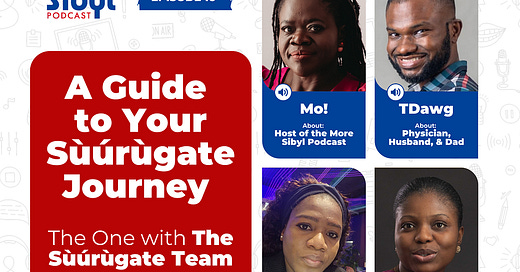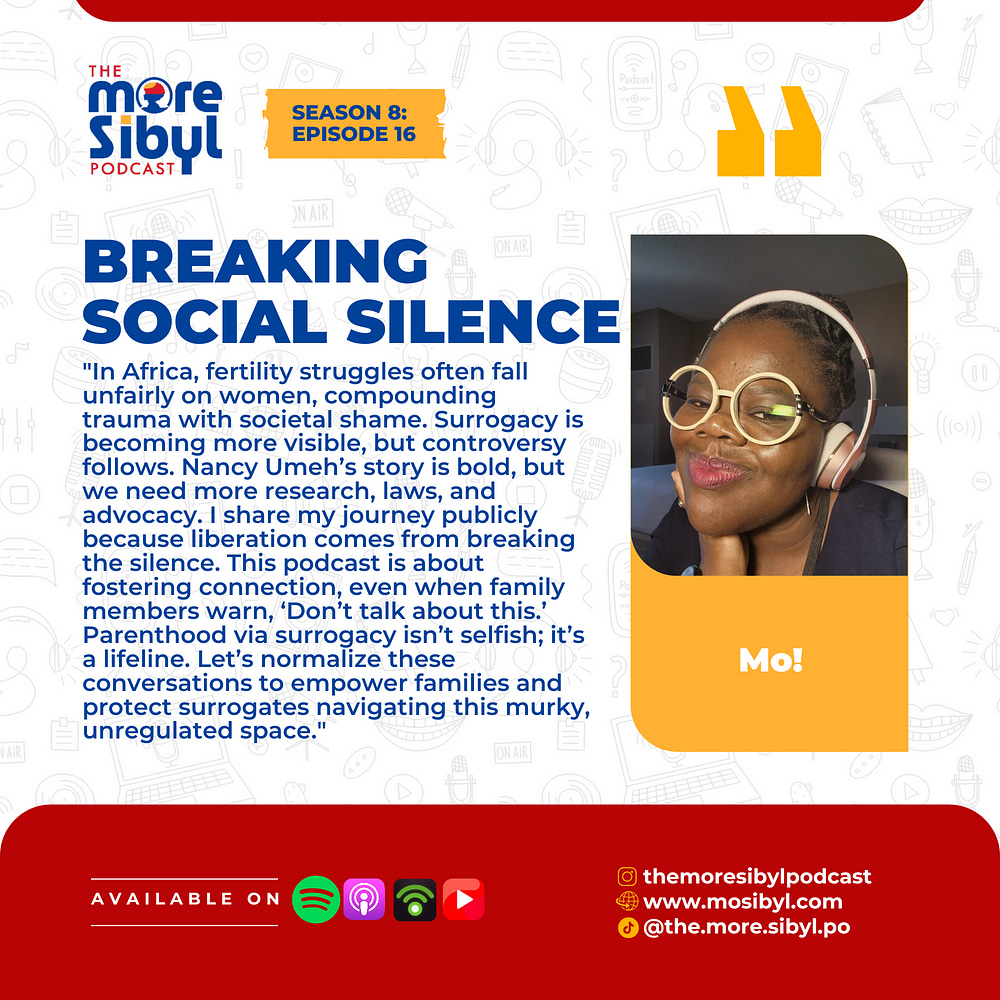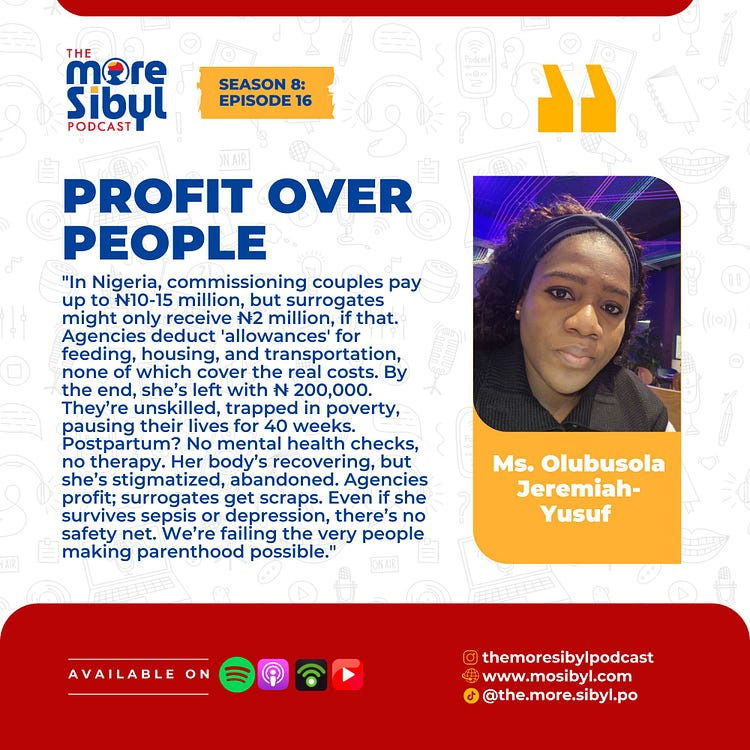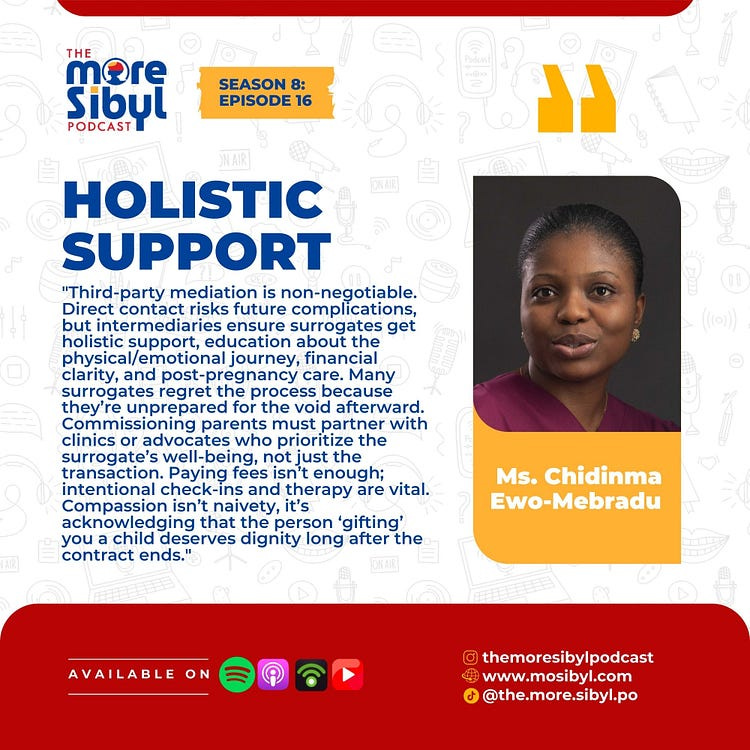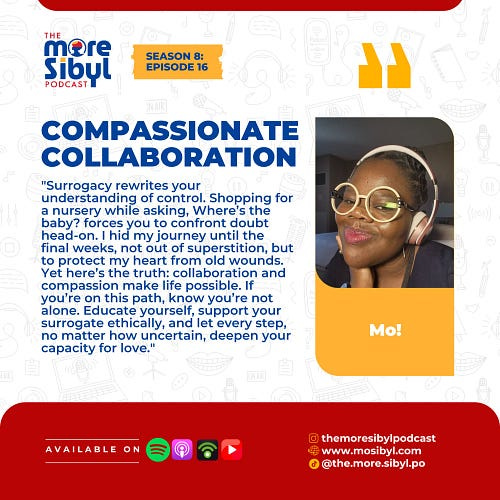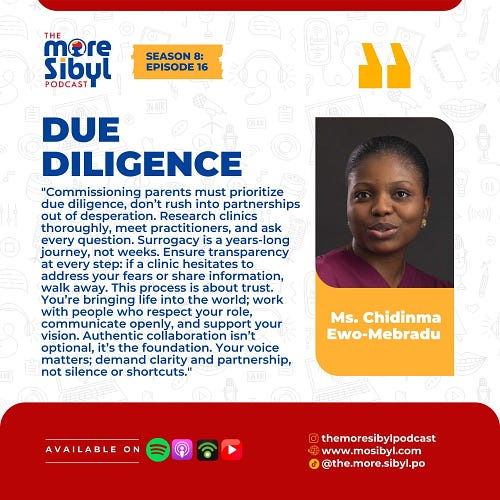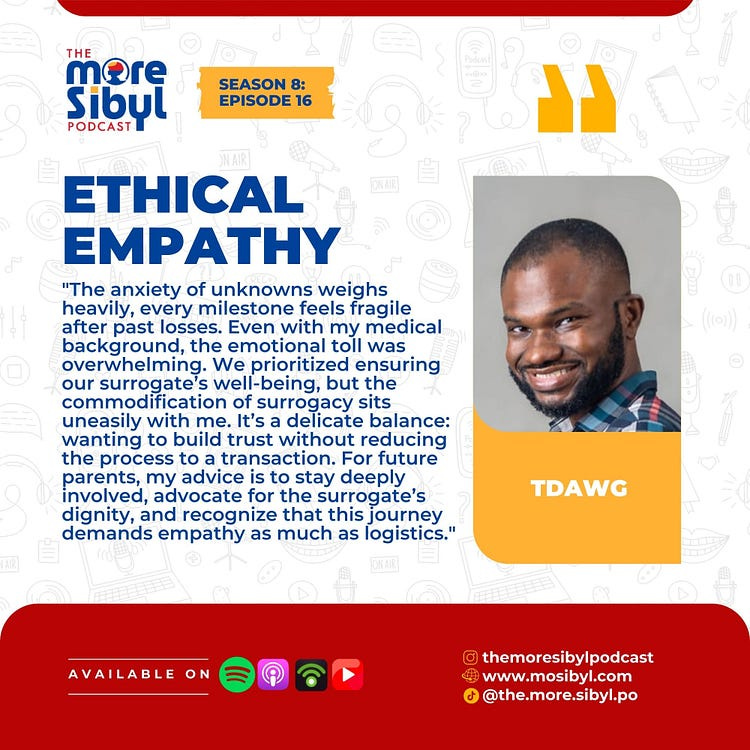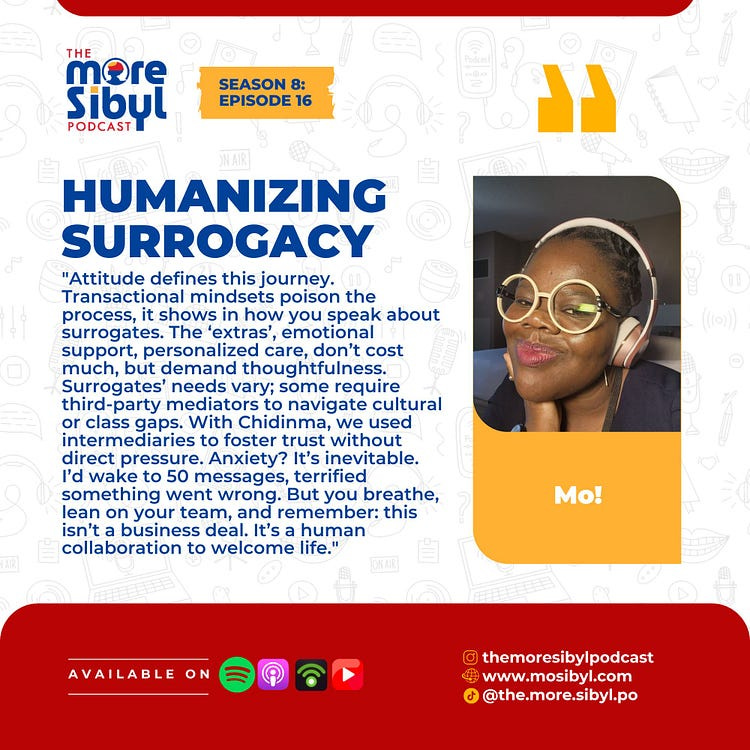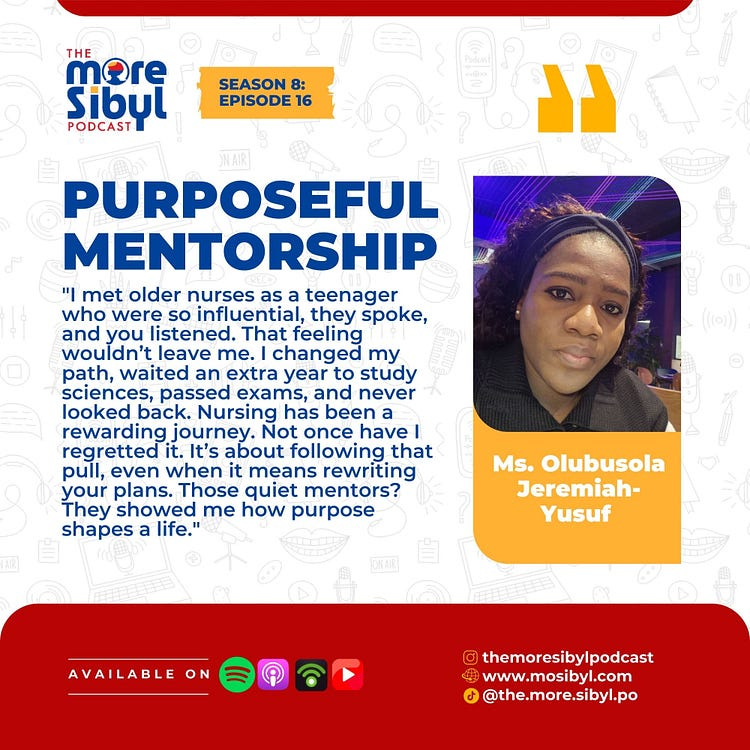A Guide to Your Sùúrùgate (Surrogate) Journey
생명의 다리|The One with The Sùúrùgate| Episode 16 (2025)
DISCLAIMER:
This episode contains heavy themes — a heads-up to anyone who may be emotionally fragile or easily triggered.
“In Nigeria, surrogacy is tangled in social class and exploitation, people monetize bodies without considering risks like mortality or lifelong health impacts. There’s no strong regulation; laws react only when crises erupt. In the UK, it’s structured: surrogates are screened, informed, and protected. They understand their role isn’t transactional. Here, many surrogates ignore the aftermath for short-term gain. No payment can compensate for the physical and emotional toll. We need education and accountability, not desperation-driven decisions.” —Busolami (2025)
“This conversation matters because surrogacy is here to stay, whether we like it or not. So many people shy away from discussing it, but transparency is key. I applaud initiatives like this that prioritize education over secrecy, enlightening people on less traumatic paths to parenthood. It’s about empathy, preparation, and ensuring everyone involved feels respected. Surrogacy isn’t just a process; it’s a partnership built on trust and shared humanity.” — Chidinma (2025)
Demystifying Surrogacy in Nigeria: A Deep Dive into Ethics, Emotion, and Empowerment
I have one goal this month: demystifying surrogacy. In today's episode, I have some amazing people to help me achieve just that. These individuals have changed my life, and I do not say that lightly. This journey was a murky and lonely road, but these people held my hand through it all. They genuinely cared about my happiness and the outcome, took my matter on their head and saw me through even the darkest moments. Let me say, no amount of "Thank you's" would be enough.
In no order of importance, there's Chidinma Ewo-Mebradu. She's a registered midwife who specializes in fertility and assisted reproduction. She works with everyone — donors, surrogates, intended parents — and brings depth and compassion to every part of the process. I've experienced her care, and I know how committed she is to helping people expand their families with as much grace and dignity as possible.
Then there's Olubusolami Jeremiah-Yusuf, a fertility nurse and coach who supports patients through their infertility journeys and treatment. She's especially passionate about ethical practices and promoting equality in assisted reproduction, particularly across developing African countries. Her work is both impactful and inspiring. Last but not least, my husband, Taiwo Adedipe aka TDawg. If you've been listening for a while, you already know him. We'll be married for 14 years in June, and I'm so grateful to have him alongside me for this conversation with his perspective as a dad. A special shout-out to Temi, my friend. She couldn't join this episode, but was integral to this journey and deserves all my gratitude. Temi, I love you!
Surrogacy in Nigeria
I've always believed that the things we avoid discussing often need the most light. This podcast has always been a space where I can be honest, even about the things that feel heavy or uncomfortable. And this conversation around surrogacy is one I am deeply connected to, not only because of the cultural and emotional complexities it holds, but because it's now a personal part of my story.
In Africa (the continent), fertility issues still carry a heavy weight, particularly for women. Even when it's a couple facing infertility, the woman is often blamed. This stigma is driven by cultural expectations that a woman's value lies in her ability to bear children and continues even as conversations around surrogacy are becoming more open in African societies. Still, controversy follows. I highly recommend Nancy Umeh's powerful story about her surrogacy journey — if you haven't seen her video on Instagram. We want to build on that discussion by sharing our experience and shining a light on the research, the laws, and the policies surrounding surrogacy. Our goal isn't just to inform, but also to advocate — especially for the surrogates, who often go unseen and unheard.
Before diving into questions with my guests, let me ground the conversation in some facts. Surrogacy, for those unfamiliar, is a third-party assisted reproductive treatment involving a woman — the surrogate — who consents to carry a pregnancy on behalf of another individual or couple. In Nigeria, it's becoming increasingly popular, particularly because adoption is complicated — believe me, I know this firsthand.
However, the growing use of surrogacy is happening in a legal vacuum. Nigeria lacks clear laws to regulate it, which has created opportunities for abuse and exploitation. There's a real need for legislation that protects all parties involved, especially the surrogates. Other countries handle this differently. In places like Germany and France, surrogacy is completely banned. In contrast, the UK and Canada allow only altruistic surrogacy — no money exchanged. In the US, while some states are surrogacy-friendly, it comes with a steep price tag — anywhere between $100,000 and $300,000.
But back in Nigeria, the system feels dangerously informal. I call it the "house help model." Agents connect surrogates with intended parents, and while the agents get paid, the surrogates receive only a small fraction. Many surrogates aren't properly fed. They don't get support. Yet they're carrying life. Think about the emotional, psychological, ethical, and even spiritual implications.
Some progressive clinics in Nigeria have tried to fill the gap by adopting international standards, like the UK's HFEA (Human Fertilization and Embryology Authority) guidelines. There have even been attempts to legislate, like the Assisted Reproductive Technology Regulation Bill and the 2024 Surrogacy Bill. But none have passed, so we're left with a dangerous power imbalance. And here's the hard truth: in Nigeria, surrogacy is still shaped by economic disparity. The middle and upper classes can afford it. The surrogates are often women in financial desperation. And that desperation is exploited. These are the fundamental dynamics we're unpacking. This isn't just about having babies, it's about fairness, dignity, and the structures that protect or fail the most vulnerable people involved.
Busolami's Journey Into Nursing
Of course, I had to start with a sneak peek into our nurses' journeys in the nursing profession. We begin with Busolami. It's easy to look at someone passionate and skilled in their profession and assume they always knew this was their path, but that wasn't the case for her. As a teenager, Busolami found herself deeply impacted by older nurses. They weren't famous, but they carried this quiet influence — when they spoke, people listened. That left a strong impression that she couldn't shake. She described it as a feeling that wouldn't go away, eventually changing her entire direction in life.
Initially, she was on track to become an accountant, just like her dad, whom she adored. So she had gone to commercial class in secondary school (amongst three options in Nigeria: Science, Commercial, and Arts), taking accounting and related subjects. But that persistent inner pull toward nursing wouldn't let her go. After graduating, even with good grades in her initial subjects, she boldly decided to pivot completely. She took a year off, dedicated herself to studying physics and chemistry through private tutorials, and sat for the WAEC exam again. It felt like confirmation when she passed: this is where she was meant to be. Since then, she's never looked back. She said she's never once regretted stepping into this field, not for a single day. Her journey into nursing may have taken a detour, but it's clear that the road she chose has been both meaningful and fulfilling.
The Red Car and a Spark: Chidinma's Journey into Midwifery
For Chidinma, it was a similar story of admiration sparked in childhood. She remembered a nurse who passed by her house every morning in a red car, always pristine in her white uniform, stethoscope draped around her neck. It became a ritual to watch her before heading to school. While that admiration didn't immediately lead to nursing, the seed was planted. After secondary school, a friend's stories about the School of Midwifery reignited that spark. Chidinma applied, got in, and found her purpose. Though the path was unconventional, she didn't initially know what midwifery entailed — what she discovered was a calling. Years later, while working in general practice, she met a patient who had conceived through IVF.
Their conversation was transformative. It piqued her interest in fertility care and deepened her resolve to help people on that path. Like Busolami, her story reminds us how indirect paths often lead to profound purpose — and how role models, even from a distance, can alter the course of our lives.
The Biggest Issue with Surrogacy in Nigeria
One of the most critical issues Busolami highlighted is the lack of information. She's practiced in the UK and Nigeria and emphasized that the two contexts are worlds apart. In the UK, everything is highly regulated — surrogates know the law, the expectations, and the risks, and are protected throughout. In Nigeria, surrogates often jump in for the money without understanding the emotional, physical, or psychological toll. She spoke about meeting surrogates who didn't realize they could die from childbirth or that they could suffer long-term consequences. Many are promised money, but after deductions for food, transportation, housing, and other costs, they walk away with as little as ₦200,000 (~$135). Busolami also explained how agents often profit disproportionately. Sometimes, commissioning parents pay ₦10–15 million, but the surrogate only gets about ₦2 million — if that. It's not just unjust, it's dehumanizing.
And it doesn't stop there. Most surrogacies in Nigeria are anonymous. Unlike in the UK, there's no relationship between the surrogate and the commissioning parents. That lack of connection, that transactional mindset — it changes everything. After the birth, many surrogates are discarded. I remember Busolami recounting a surrogate who told her that once the baby was delivered, the parents vanished. That surrogate was likely dealing with depression, and no one was there to help her.
What happens after the baby is born? The woman's body is still healing, her life still disrupted. People around her can tell she just had a baby, but there's no child in her arms to explain it. She might be dealing with stigma. She might have other children she left behind to carry this pregnancy. And she's still figuring out how to get back on track, financially and emotionally. What stuck with me most was this: nobody can pay you enough for what you're doing. That's what Busolami tells surrogates and donors. And it's true. They're the most critical players in the whole process. Without them, there's nothing. And yet, they're treated as expendable.
If I could go back and whisper something to myself, I would ask the hard questions. Who is protecting these women? Who's educating them? Who's staying with them after the baby is gone? Because right now, we're failing them. And if we don't address it, we're headed for a kind of exploitation we're unprepared for.
"Understand What You're Getting Into": Chidinma's Candid Words
Chidinma echoed this concern. She noted that many surrogates are unaware of what they're signing up for. She gave an example of a surrogate who left the hospital with ₦650,000 and no clear plan on what to do next. The disappointment, regret, and vulnerability that followed are all too familiar.
On the agency side, Chidinma shared how poorly structured most of them are. Even agents operate under constraints, passing only minimal amounts to surrogates after they take their cut. Housing and living conditions are often subpar, and many surrogates enter into contracts they don't fully understand. She stressed the need for education, proper conversations, and genuine support systems to help women understand their rights and options.
The Anxiety Behind the Scenes: A Father's Perspective
Taiwo brought in the male and medical perspective. Despite his clinical understanding of the process, he described the anxiety he felt throughout, from waiting for pregnancy test results to worrying about the baby's development. The emotional rollercoaster was real. He also discussed how important it was to prioritize the surrogate's well-being. After our previous loss, we felt we had done well enough. This time, we wanted to be intentional, without being overbearing. It was a delicate balance. Taiwo expressed concern over how easily surrogacy could become transactional. He warned against approaching it like a business deal and emphasized the importance of thoughtful, respectful engagement.
Putting the Surrogate First
Throughout our journey, I always tried to put the surrogate first, even when it conflicted with my hopes or expectations. I asked questions — sometimes too many — but I wanted to ensure she was safe and cared for. With the help of Chidinma and Busolami, I learned how to channel my intentions into informed, ethical choices.
I'll never forget the day Taiwo and I went for a surrogacy consultation. I had a million questions for the doctor, and by the end of that conversation, I was ready to walk away from the whole idea. The doctor was brutally honest. He said, "People don't take care of the surrogates well. That's the truth." They don't care how they eat, they don't pay them enough, and they don't consider their psychological health. There are no protective laws in Nigeria for surrogates.
Then there was the painful loss we experienced. As Taiwo mentioned earlier, it exposed a vacuum in communication between us and the surrogate. That miscommunication led to a costly mistake. When we finally shared the story with Busolami, she pointed out everything that could have been done differently. It was a hard lesson, but it led us to bring Chidinma in as a formal intermediary between us and the surrogate.
That decision changed everything. The wisdom of these women, Chidinma and Busolami, was priceless. I often thought differently as someone living abroad, but they helped me translate those ideas into a local, practical reality. For example, I once asked if the surrogate could hold the baby briefly after birth, just a moment to acknowledge the life she helped bring into the world. I was gently but firmly told, "No, you're not allowed to do that." They explained it wouldn't be psychologically healthy for her in the long run. Despite my intentions being pure, I had to let go of that plan.
What we were intentional about, though, was therapy. We pushed hard to make sure she had access to therapy both before and after the birth. This isn't about looking generous but doing what was right. I speak now directly to commissioning parents: if you are doing surrogacy in Nigeria, then you already have the means to do it. Providing psychological and emotional support shouldn't be optional — it's the least we can do. We made sure she had proper accommodation, learned about her family dynamics, and offered some form of support. Because here's the truth: after the baby is born, the surrogate doesn't have anything to hold onto — no physical reminder of what her body just went through. Yet the trauma remains. And many of these pregnancies end in caesarean sections, which come with their share of complications and pain. I've never had one, but I can only imagine the physical and emotional toll. Focusing on the baby is easy, and you forget the body that carried them. But if this journey taught me anything, we cannot afford to ignore it.
Supporting Surrogates with Heart, Not Just a Contract
Chidinma and Busolami offered powerful tips on how commissioning parents can better support surrogates:
Use a trusted third party to manage communication.
Provide education to help surrogates fully understand the journey.
Ask about their financial goals and help them plan.
Ensure fair compensation and basic comforts.
Offer therapy and follow-up care.
Avoid creating class-based imbalances, mainly when social dynamics differ.
It's not just about the money. It's about dignity, intention, and creating space for the surrogate to feel supported, not discarded.
Navigating the Weight of Anxiety as Intended Parents
One of the most unexpected parts of our surrogacy journey was anxiety. Not just the anxiety I expected from navigating something so delicate and complex, but the quiet, persistent kind that crept into my everyday moments. I remember waking up and seeing 50 unread messages on my phone. I thought, "Oh my God, what's going on?" It was never instant relief. I would have to scroll through everything to get to the update — only then could I exhale.
Chidinma played a significant role in managing that tension. On days when the surrogate had antenatal visits, she often went with her, and I'd be waiting, refreshing my phone. Eventually, she'd send a report, letting me know everything went well. Even after the long struggle of trying to conceive naturally, then deciding to try surrogacy, we still faced heartbreak. It felt like I was the common factor in all the disappointment. That's a hard place to be mentally, and I returned. Though Taiwo shared that I didn't always show my anxiety. When we first got the positive pregnancy test, we were happy, butt cautiously so. That cautious optimism lingered all the way through. As each day passed, then each week, the month, the anxiety didn't let up; it built. He even had dreams about defects, and I reminded him, "Don't worry, all the organs will come out complete." We were trying to reassure each other as best we could.
What helped us most was talking about it, being honest about our fears, and praying together. Prayer became a core part of how we coped. We made declarations over the pregnancy, and we prayed for the surrogate regularly. That's something that continues even now. Though the transactional part of our relationship — bringing the baby into the world — is technically over, she's forever part of our family's story. We still check in through Chidinma. That connection doesn't just vanish. It's lasting and sacred.
Wisdom for Commissioning Parents
One of the most challenging parts of this journey was our first loss. The grief was profound, and it shook me. But even in the pain, I refused to blame the surrogate. She had tried to give us a gift. I wanted her to feel appreciated, not blamed or forgotten.
Busolami and Chidinma both stressed the importance of emotional preparation. Busolami said it plainly: the anxiety is real. It doesn't matter how strong you are or how many times you've tried — surrogacy is an emotional rollercoaster. She emphasized how essential it is to walk this journey with your partner. This isn't something you can do alone. Even in traditional pregnancies, men often feel anxious. So in surrogacy, where everything feels just a bit more out of reach, the need for open, honest communication is even greater.
She also mentioned something that often gets overlooked: the state of your marriage. If there are cracks or tensions in the relationship, now is the time to speak to a counselor. You don't want to bring a child into a home that isn't ready. As she said, you're not just having a baby to prove a point to the world. You're raising a human being who will one day contribute something meaningful to it. That bigger picture — nurturing, growing, and preparing a child to make a difference — must guide your preparation.
Chidinma built on this by reminding us that surrogacy is, at its core, a journey of faith. As commissioning parents, we have to trust the process. The bond that forms when you and your partner walk through that process together — supporting each other, making decisions together, waiting together — can be a powerful preparation for parenting. That shared experience strengthens your foundation and deepens your readiness to receive and raise a child.
She stressed the importance of choosing practitioners you can trust. These aren't just medical professionals; they're the people who'll be walking closely with you through one of the most vulnerable seasons of your life. You need people who bring you peace of mind, can hold space for your fears, and guide you through them with understanding and competence.
What to Look for in a Fertility Clinic: Lessons from Experience
Choosing the right clinic matters. Ours came highly recommended, and we appreciated their comprehensive support, from donor matching to legal assistance to surrogate management. But even with a good clinic, missteps can happen. We learned this when a communication gap led to a preventable loss. We later had a challenging conversation with the clinic, and to their credit, they improved. But I wish we had asked more difficult questions from the start:
How do they manage the transition from fertility to obstetrics?
Who handles postnatal care?
What happens in the event of complications?
Can you opt out or transfer care?
Don't wait to find these things out after a loss. Learn from us. Ask early. Be clear.
How to Truly Support Surrogates: Respect, Resources, and Relationship
One of the most prominent themes that kept coming up in our conversation was how we, as commissioning parents, can offer real, tangible support to surrogates. These women are helping bring our dreams to life. If we could do it ourselves, we wouldn't be here. The very least we can do is treat them with dignity and care throughout the journey. Here are the key points that stood out from what Chidinma and Busolami shared, plus my own experience:
Respect Their Humanity: Speak about and treat surrogates as partners, not employees. They're not "omo odo" (domestic help). They're part of your journey, not beneath it.
Provide Education & Financial Guidance: Ask about their plans — how do they intend to use the money they're earning? Do they have a financial or business plan? Are they thinking about their future and their own family's needs? Help connect them with resources or professionals who can guide them.
Use a Liaison or Third Party: Work with a trusted intermediary who can communicate clearly with the surrogate, answer her questions, and represent both parties fairly. This helps bridge gaps in knowledge or comfort without pressure.
Ensure Fair and Equitable Compensation: Advocate for the surrogate's fair share of the fees, not just a tiny fraction. No money can truly compensate for this act, but there should at least be equity in how the funds are distributed.
Support Healthcare Access: Surrogates should receive comprehensive medical care during pregnancy and postpartum. That includes access to premium medication and follow-up care even after delivery.
Include Therapy and Emotional Support: Pregnancy, especially through surrogacy, can be emotionally intense. Offer access to therapy, even just occasional check-ins, to support her mental well-being.
Build Supportive Surrogate Communities—well-being community support among surrogates. Imagine a day when they feel empowered enough to form networks, advocate for their rights, and define their standards of care and payment.
Partner with Ethical Clinics and Agencies: Choose clinics and professionals who put surrogate well-being at the forefront. Our doctor, for example, we consider sending an extra allowance for food and nutrition, not as direct payment, but through partners who'd handle shopping and deliveries on her behalf.
Pray and Stay Connected: Keep your surrogate in prayer and, through your liaison, stay connected to her well-being as best you can. The bond doesn't have to be well-behaved or constant, but should be caring.
Secure All Legal Frameworks Side: Make sure all legal paperwork is solid. Protect everyone involved by being thorough with contracts and obligations.
The heart of it all is this: surrogates make the magic happen. Let's ensure the support we give matches the significance of their actions.
Wrapping Up: Emotional Prep, Practical Plans, and the Power of Trust
I let my guests leave a few parting words to wrap up the conversation. Busolami reminded us that if surrogacy is in your heart, go for it — but do it the right way. This service is available; people like her and Chidinma are here to help. But it has to be done with integrity, so that everyone involved — intended parents, surrogates, agencies — walks away from the process with joy, not trauma.
Chidinma echoed that. Whether people want to talk about it or not, surrogacy is here to stay. She emphasized how grateful she was for this conversation, noting that this topic is rarely discussed publicly apart from Nancy's episode. She also called out why I do this — because I want people to be informed, and to take the least traumatic route to their dream of parenthood. That means being open, vulnerable, and honest about what this path can look like.
And Taiwo jumped in to thank Chidinma and Busolami for helping us realize our dream. He reminded us how critical it is for couples to keep discussing their fears, anxieties, and faith. That's something we did consistently, and it helped us stay grounded.
Now, I want to emphasize something we didn't talk much about: the emotional preparation, especially for moms.
My journey to motherhood didn't look like anything I planned, and if you're like me, someone who's highly visual and needs tangible proof to connect emotionally, it can be tough. There's this strange disconnect when the pregnancy isn't happening in your body. Your body's not changing, but your life is. So your mind has to catch up.
Here's what helped me:
Track the journey: I downloaded the BabyCenter app to follow the baby's growth weekly.
Plan bonding: Think ahead about how you'll bond with the baby, for some, that might include breastfeeding, like Nancy did. I didn't go that route, but it's an option.
Make space for anxiety: I didn't tell many people until close to delivery — some friends found out a month before, and even some family just a few weeks out. It wasn't a secret. It was emotional protection, especially after a previous loss.
Build your faith muscle: This journey was a profound lesson in patience and trust. I had to believe even when I couldn't see anything happening. The faith that carried me through was no joke.
And let's not forget — whatever you get out of prayer, you'll need prayer to sustain yourself. Keep praying. Pray for your baby. Pray for your surrogate. Pray for yourself.
Surrogacy changed my life. It's a gift I'll never stop being grateful for. It's not for everyone, but if it's for you, I hope this episode helped pull back the curtain. It takes preparation, empathy, and trust. Build strong partnerships. Educate yourself. Support your surrogate ethically and generously.
That's how we change the narrative around surrogacy, especially in Nigeria.
Thanks again for listening and riding with me. If this resonated with you, listen to the full episode for insights from Chidinma, Busolami, and Taiwo. And stay tuned for the next episode, where we'll tackle what it takes to bring your baby abroad — a conversation that's never been done on a podcast before. You won't want to miss it.
If you're thinking about surrogacy or exploring family-building options, know this: you are not alone. There's a whole community and support network out here for you. That's what HOPES — Helping Our People Expand Safely— is all about. Begin here: https://forms.gle/o5pbimJr1NQ9oHAY6.
You can connect with Busolami and Chidinma via their socials and emails linked in the show notes. Till the following conversation, Mosiblings, see you then!
🅻🅸🅽🅺🆂:
Download: https://mcdn.podbean.com/mf/web/y9vrf8ztnrj2thez/HOPES2025.mp3
Or on the website: www.mosibyl.com

